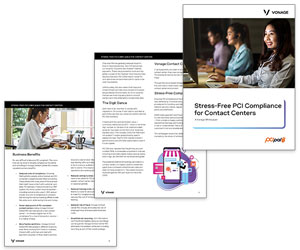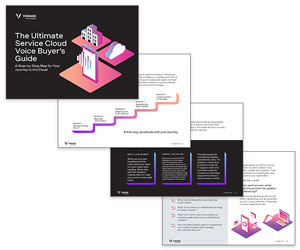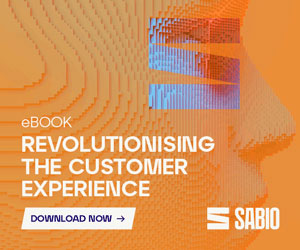Here are some innovative ideas that we picked up on a site visit to the Vax contact centre in Droitwich.
1. Allow Low-Satisfaction Customers to Bypass the IVR
| Vax Fact File | |
|---|---|
| Contact volume – per month | Inbound calls: 40,000 Emails: 25,000 Live Chat: 12,000 |
| Advisors | 65 Seats |
| Technology | |
| ACD | NewVoiceMedia |
| Headsets | Avalle |
| Wallboards | NewVoiceMedia |
| Call Recording | NewVoiceMedia |
| Call Scoring | Salesforce |
| Agent Desktop | Thinclient |
| Scripting | Salesforce – Inhouse development of Visual Workflow |
Over the past few months, Vax have been putting a lot of work into their IVR system and thinking of creative ways to route certain types of customers to the most appropriate advisor.
One particularly interesting method was how Vax routed customers who had previously given them a low Customer Satisfaction (CSat) score past the IVR and straight through to an advocate advisor. These are advisors who have had consistently high-quality scores over the past two months.
Other innovative uses of the IVR included:
- Allowing existing customers to bypass the IVR completely, using the intelligence within the CRM of where they are in their personal journey
- Changing the voice for different sections of the IVR journey (increased personalisation feeling)
- Routing the customer back to the same advisor that they had spoken to before if their previous contact was in the last 30 days
Also, Vax build messages into their IVR systems that customers listen to instead of hold music. These messages are used for promotions of products and are created in partnership with the marketing department, so they align with TV campaigns, advertising etc.

Take a look inside Vax’s Droitwich contact centre
2. Give the Following Advice for Dealing with Difficult Customers
When an advisor has to deal with a customer who becomes abusive, Vax asks them to avoid defending or justifying the business or themselves and to simply give the customer the space to vent. The key message here is to let the customer have their say and try not to take it personally.
While it is easier said than done, Vax encourages advisors to stay assertive and calm if the customer’s anger continues. However, if a customer starts to abuse an advisor in a severe way – e.g. through racism, sexism etc. – a manager will call the customer back.
During this call-back, the manager gently reaffirms the Equality Act and what is acceptable. This call helps to promote a team ethos, while giving the customer a chance to right a wrong and apologise when they have settled down, as often the abuse is misdirected.
The problem with letting customers vent used to be that advisors at Vax were targeted against Average Handling Time (AHT), meaning that advisors sometimes interrupted an outburst, further upsetting the customer.
So, the contact centre decided to do away with this measure as a target and instead focus on First Contact Resolution (FCR). While this did increase AHT, the team at Vax to consider it to be a key part of reducing repeat contacts and, in a way, improving efficiency.
3. Create Motivational Games Around Mega-Events
Mega-events come with a great atmosphere and spirit, which Vax try to bring into their contact centre through running relatable games that provoke healthy competition between advisors.
For example, during last year’s Olympic games, each section of the contact centre floor was given a country and participated in events like paper plate discus and paper plane javelin to boost morale and motivation levels.

The contact centre team play a game of plate discus, as teams represent different nations in honour of the Olympics
Furthermore, events are run throughout the year, including Valentine’s Day, Easter, Halloween and Christmas, with the contact centre currently planning a specialised “12 Days of Christmas”.
Running motivational games around these times has also proven to be a useful tool in lowering absenteeism and boosting performance, as Vax were keen to stress that advisor happiness is central to high performance.

Vax also change their dress code during major events
4. Offer Advisors Twelve Flexi-Shifts a Year
Vax’s contact centre, like many others, used to struggle with lateness and absenteeism. Simply giving advisors the opportunity to have twelve flexi-shifts a year, without amending the existing rotational schedule, has removed lateness and improved absenteeism.
So, if an advisor knows that they are running late, they can defer their start time by 90 minutes and simply add the deferred time to end of their shift.
For example, if an advisor’s shift is set from 9am to 4pm, but they realise before that they will not be able to get there in time, they can phone in ahead of 9am and ask to use a flexi-shift. This allows the advisor to arrive at any time between 9am and 10:30am. So, if the advisor is 45 minutes late, and has chosen to use a flexi-shift, their shift would start at 9:45am and finish at 4:45pm.
Given the exact nature of scheduling advisors in the contact centre, this initiative may seem surprising. However, this has helped to reduce general lateness and absenteeism by a significant margin.
In addition, such an initiative can be a great method of improving employee engagement, as it offers advisors greater control over their working lives. It also doesn’t require the same amount of effort as scheduling shift swaps or implementing an annualised hours scheme.
5. Implement an “Open Door” Policy
To emphasise to advisors that they can come and speak with managers with any problems or requests, Vax have implemented an “open door” policy for management. This promotes two-way communication and proactive engagement with the team.
Senior staff keep their office door wide open, while also adhering to a “go out and speak to somebody new” rule.
The contact centre manager and other senior staff keep their office doors wide open, while also adhering to a “go out and speak to somebody new” rule.
This rule is enforced so that every member of the senior team should go out and speak to a member of the team who they would not ordinarily speak with. With the contact centre only having 65 seats, this has proven a great way to boost team cohesion.
6. Focus on Lowering Effort – for Employees and Customers
Vax track a Customer Effort Score (CES) to monitor which call types are causing most exertion for their customers, allowing them to improve processes and monitor advisor performance.
The Customer Engagement Team live by the motto “easy to do business with”. This means they will always try to focus on what they can do for their customers, and this ethos also extends to their team. So, advisor processes are regularly reviewed to help minimise effort on their part too.
In addition, team champions from across the contact centre are invited to sit in on team meetings and, as end-user representatives, are part of any proposed changes to the contact centre environment or procedure.
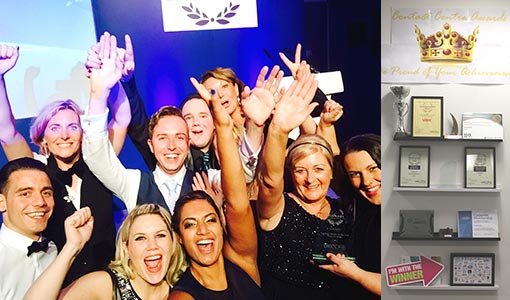
Here is Vax’s contact centre team winning another award to add to their collection
7. Include Advisors When Designing a Script
With decreasing employee effort being a key target in the Vax contact centre, the company created a script with the help of its trusted advisors, to offer suggestions for what to say in certain scenarios and during specific contact types.
This coincided with the in-house development of a Visual Workflow, which provides advisors with a visible route through the call, while also showing all the relevant customer information on the screen, as soon as the call comes through.
Vax’s advisors also helped to design the proposed routes through the call, while their input is also used by the company’s design team, as the contact centre is considered as a great Voice of the Customer (VoC) resource.
8. Introduce Hybrid Working – Office & Home – Especially Over the Christmas Period
Vax have had great success by offering advisors the chance to occasionally work from home. In fact, the company believe that it is a key reason for its decreasing level of attrition and adherence issues.
Also, productivity is also said to have increased, as homeworkers think that there is greater scrutiny placed upon them.
This is one reason why Vax increase the number of advisors who work from home over the Christmas period, while it also becomes easier to ask advisors to work overtime during peak periods, most notably Christmas.

Increasing the number of homeworkers at Christmas doesn’t seem to be taking the festive spirit away from the contact centre
9. Change the Advisor Job Title to “Customer Engagement Executive”
While the term “contact centre advisor” has been used throughout this article, it is not the job title that Vax use for their frontline staff. Instead, the company let the team choose their own job title.
In doing this, the team decided to go by the title “Customer Engagement Executive” as opposed to “Customer Service Advisor”.
This could be considered a simple change, yet, allowing the team to make this decision for themselves allowed a title to be created that advisors could wear as a “badge of honour”.
Having a title that does this could have sparked greater enthusiasm for the role, while giving the team a chance to contribute to a significant business decision.
For a greater discussion on this topic, read our article: What Should We Call Frontline Call Centre Staff?
10. Create Salary Bands to Reward Consistently Good Performance
Vax have a clear salary band system, which is split into four tiers, each of which is linked to performance. These range from £15,500 to £19,200.
The four tiers include:
- New Entrants – Developing
- Customer Proficient – Attains
- Customer Expert – Over Performs
- Customer Advocate – Transforms
Performance is reviewed monthly and banded accordingly depending on their average scorecard results over the previous two months.
These scorecards are based on metrics such as FCR and Net Promoter Score (NPS), sales performance and the results of quality monitoring.
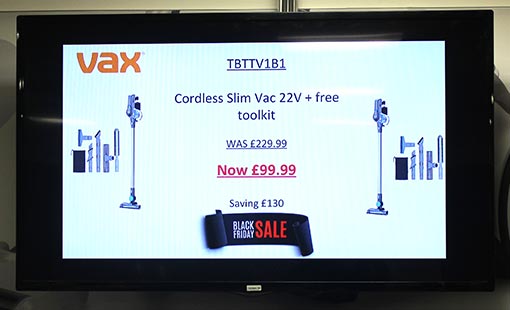
Marketing deals are also shown on contact centre wallboards, so advisors are made aware of upcoming offers
11. Pick up the Phone if There’s no Second Contact Resolution via Email
Across all contact centre channels, Vax have a FCR rate of 89% and a Second Contact Resolution (SCR) rate of 92%. However, there are still cases where another contact is required.
When such an instance occurs on the email channel, Vax ask their advisors to pick up the phone and call the customer instead.
Although it is a general contact centre principle to stick to the customer’s preferred channel choice, an email conversation can last for days on end, and advisors are asked to call so that customer frustration doesn’t build over this period.
12. Provide a Copy of the Schedule That the Team Can Access
One of the employment engagement initiatives was for the team to see the schedule in advance, to gauge availability.
When members of the team apply for time-off and they receive no explanation for a refusal, it can lower morale.
One of the employment engagement initiatives was for the team to see the schedule in advance, to gauge availability, rather than requesting and being refused.
This is a strategy that Vax have in place and the contact centre’s Resource Planning Manager makes herself personally available to speak to advisors about time-off requests.
In fact, at Vax, all HR requests go to the Resource Planning Manager, so that advisors get an insight into the difficulty of scheduling and the planning team can personally hear advisor cases for needing time-off.
13. Start Apprentices off on Live Chat
To add more variety to the advisor role and optimise resources, Vax advisors handle queries across multiple channels, with an initial focus on live chat.
Why? Because live chat is primarily reserved for apprentices, as apprentices are generally quite young and live chat can be similar to messaging a friend, as it does not require the same formality as an email or letter, or have the pressure of a live phone call.
Vax have seven people in their contact centre, who are on their apprentice programme and live chat is the first part of their journey.

Apprentices and other members of the team take part in a contact centre bake-off!
14. Trial Run Messenger as a Customer Service App
After a six-month trial period, Vax now use Messenger as an additional channel to provide customer service. This is despite the number of contacts that come through the channel being less than 1% of overall contacts.
But Vax expect there will be a rise in future uptake of the channel, believing that the growth of the channel could well match the rise in popularity of live chat.
This comes after the percentage of overall contact volumes that are live chat contacts grew from less than 1% to just shy of 20% from 2014 to 2017 in the Vax contact centre. Similar to other contact centres, Vax has seen a reduction in phone contacts from 89% to 48% in 2017.
When it is considered that 1.5 times more messages are sent over Messenger than SMS each year, it appears Messenger could well become the next mainstream channel for simple enquiries. This is the argument Vax make and they join other innovative companies such as Uber, KLM and Burger King in deploying the channel.
Thank you to Vax for facilitating our visit to their Droitwich contact centre.
But what about you? Do you fancy showing off your contact centre?
If so, you can contact: newsdesk@callcentrehelper.com and maybe we will see you soon!
Author: Robyn Coppell
Published On: 29th Nov 2017 - Last modified: 21st Jan 2025
Read more about - Call Centre Management, Customer Effort, Editor's Picks, Games, IVR Solutions, Scheduling, Site Visits, Vonage











